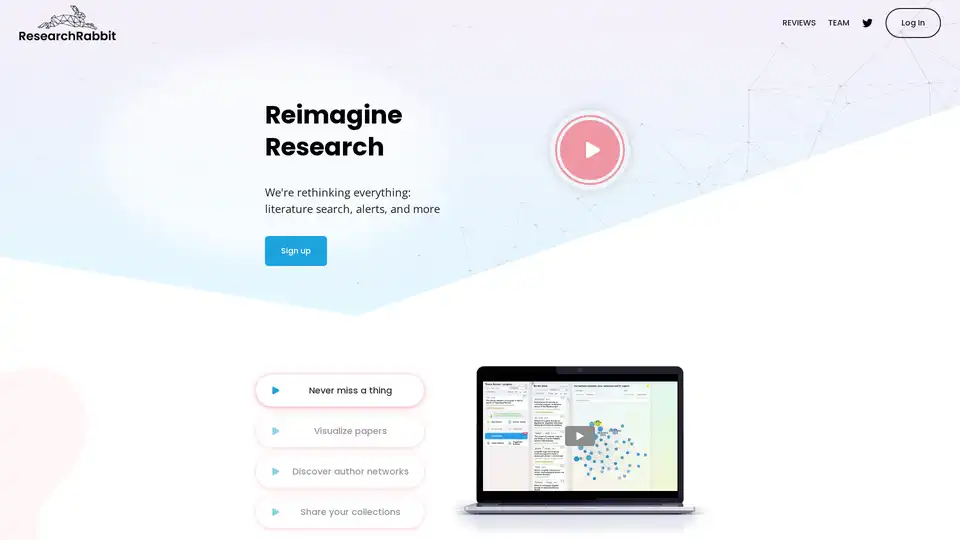
ResearchRabbit
Overview of ResearchRabbit
What is ResearchRabbit?
ResearchRabbit is an innovative AI-powered platform designed to revolutionize how researchers conduct literature reviews. Often dubbed the 'Spotify for Papers,' it streamlines the discovery, organization, and exploration of academic literature, making the process faster and more intuitive. By leveraging artificial intelligence, ResearchRabbit helps users build personalized collections of papers, uncover hidden connections, and stay ahead of research trends without the hassle of manual keyword searches or overwhelming databases.
At its core, ResearchRabbit addresses a common pain point in academic and scientific workflows: the time-consuming task of sifting through vast amounts of publications. Instead of struggling to identify the right search terms, users can simply input a starting paper or topic, and the AI takes over, recommending relevant studies and visualizing relationships. This tool is particularly valuable for anyone in academia, from graduate students to seasoned professors, who needs efficient ways to navigate scholarly work.
How Does ResearchRabbit Work?
ResearchRabbit operates on a user-friendly, web-based interface that mimics familiar music streaming experiences to make research feel more accessible. Here's a breakdown of its core mechanics:
Starting Your Collection: Begin by signing up for a free account on the ResearchRabbit website. Upload a seed paper (via link or DOI) or search for topics directly. The AI analyzes the content and metadata to generate initial recommendations, learning from your interactions to refine suggestions over time.
AI-Driven Recommendations: Powered by machine learning algorithms, the platform scans millions of papers from sources like PubMed, arXiv, and Semantic Scholar. It identifies semantic similarities, citation patterns, and thematic overlaps, presenting results in a clean, non-intrusive feed. Unlike traditional search engines, it avoids spam by only surfacing high-confidence matches.
Visualization and Mapping: One of ResearchRabbit's standout features is its interactive graphs. Users can create visual citation maps that show how papers connect through references, co-authorships, and shared topics. These graphs act as dynamic entry points—click on a node to explore clusters or dive into author networks.
Personalized Updates: Set up collections based on your interests, and receive digest emails with new papers. The AI filters for relevance, ensuring you get curated insights without inbox overload.
Integration and Export: Seamlessly integrate with tools like Zotero for citation management. Export collections, share graphs, or collaborate in real-time, fostering teamwork on projects.
The platform's algorithms prioritize recency, impact, and relevance, using natural language processing to understand context beyond keywords. This makes it ideal for exploratory research where serendipity plays a role.
Key Features of ResearchRabbit
ResearchRabbit packs a suite of features tailored for modern researchers, emphasizing efficiency and collaboration:
Intuitive Exploration: No need for complex queries—start with one paper and let the AI expand your horizon. It's perfect for discovering tangential works that might spark new ideas.
Personalized Recommendations: The system adapts to your preferences, much like a streaming service. Add papers to collections, and watch as suggestions improve, highlighting emerging trends in your field.
Powerful Visualizations: Generate interactive networks of papers and authors. These aren't static charts; they're explorable maps that reveal co-authorship patterns and citation flows, helping users spot influential studies or gaps in the literature.
Non-Spammy Alerts: Stay informed with weekly digests of relevant papers tied to your collections. The AI's confidence scoring ensures only pertinent content reaches you, reducing noise in your workflow.
Sharing and Collaboration: Build shared collections with colleagues, add comments, and co-explore graphs. This feature shines in team environments, like lab groups or interdisciplinary projects, enabling collective discovery.
Zotero Integration: Effortlessly sync your library, pulling in annotations and metadata to keep everything organized.
Additional perks include author discovery tools, which map out networks of experts, and privacy-focused design that respects user data without aggressive tracking.
Use Cases for ResearchRabbit
ResearchRabbit excels in scenarios where literature reviews form the backbone of work. For instance:
Academic Literature Reviews: Graduate students writing theses can quickly assemble a comprehensive bibliography. Input a foundational paper, and within minutes, visualize a web of 100+ related studies, saving hours of database hopping.
Grant Proposal Preparation: Researchers applying for funding use citation maps to demonstrate field knowledge and identify collaborators. The tool's trend tracking helps highlight cutting-edge areas to strengthen proposals.
Journal Club or Seminar Prep: Faculty members curate collections for discussions, sharing interactive graphs that make complex topics more engaging for students.
Interdisciplinary Research: In fields like AI ethics or climate science, where papers span domains, ResearchRabbit uncovers cross-pollinations that manual searches miss.
Real-world example: A user shared, "The best thing is that you don't have to go through all the struggle to figure out what words are required for your research and you can just sit back put a link of a paper that you already have and start reading." This testimonial underscores its ease for busy professionals juggling multiple projects.
Why Choose ResearchRabbit?
In a sea of research tools, ResearchRabbit stands out for its balance of simplicity and depth. It's free to start, with no ads cluttering the experience, and its AI is tuned specifically for scholarly content rather than generic web searches. Users report saving significant time—often hours per session—while gaining deeper insights through visuals that traditional tools like Google Scholar can't match.
Compared to competitors, it emphasizes collaboration and personalization without requiring advanced technical skills. Plus, with thousands of researchers already on board, the community aspect adds value through shared collections and emerging features like advanced alerts.
The platform's commitment to non-intrusive notifications and high-quality recommendations aligns with best practices in AI ethics, ensuring trustworthy outputs. As one satisfied user noted, it's a game-changer for workflows, blending discovery with organization seamlessly.
Who is ResearchRabbit For?
This tool is ideal for:
Students and Early-Career Researchers: Those new to systematic reviews who need guidance without steep learning curves.
Academic Faculty and PIs: Professors managing labs, seeking efficient ways to monitor field progress and mentor teams.
Industry R&D Professionals: In tech, pharma, or policy, where staying current on publications drives innovation.
Collaborative Teams: Any group working on papers, reviews, or patents that benefits from shared, visual knowledge bases.
If you're tired of fragmented searches and endless scrolling, ResearchRabbit offers a smarter path. Sign up today at researchrabbit.ai to supercharge your research journey and join a thriving community of knowledge seekers.
Best Alternative Tools to "ResearchRabbit"
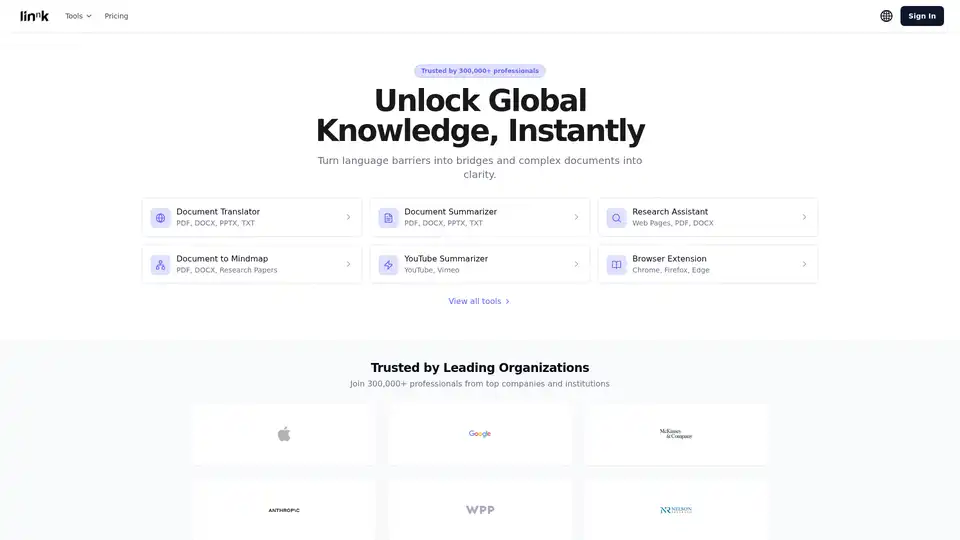
Linnk.ai: AI-powered summarizer & translator for documents and web content. Quickly extract insights from PDFs, DOCX, PPTX, and more. Perfect for research and workflow efficiency.
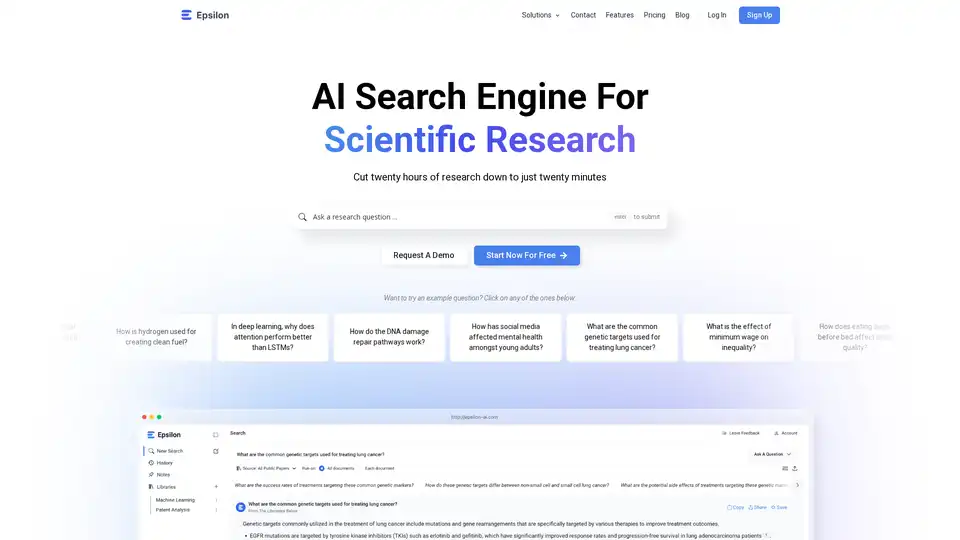
Epsilon is an AI search engine for scientific research, providing cited answers, publication search, and information extraction from 200M+ papers. Trusted by 30,000+ researchers.

Paperguide is an AI research assistant that helps you find & analyze research papers, manage references, get research-backed answers, and write documents faster.
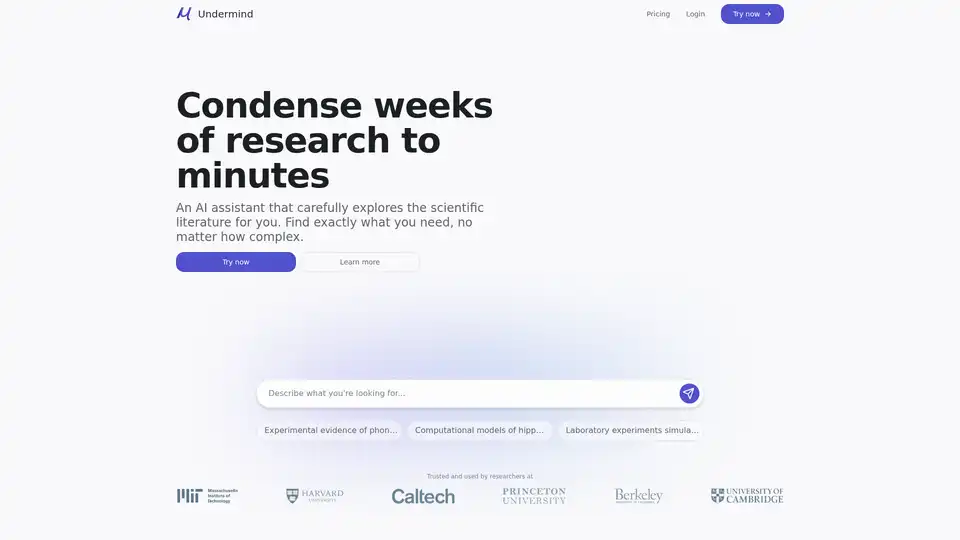
Undermind is an AI-powered research assistant that autonomously reads hundreds of scientific papers to deliver precisely relevant insights, condensing weeks of research into minutes.
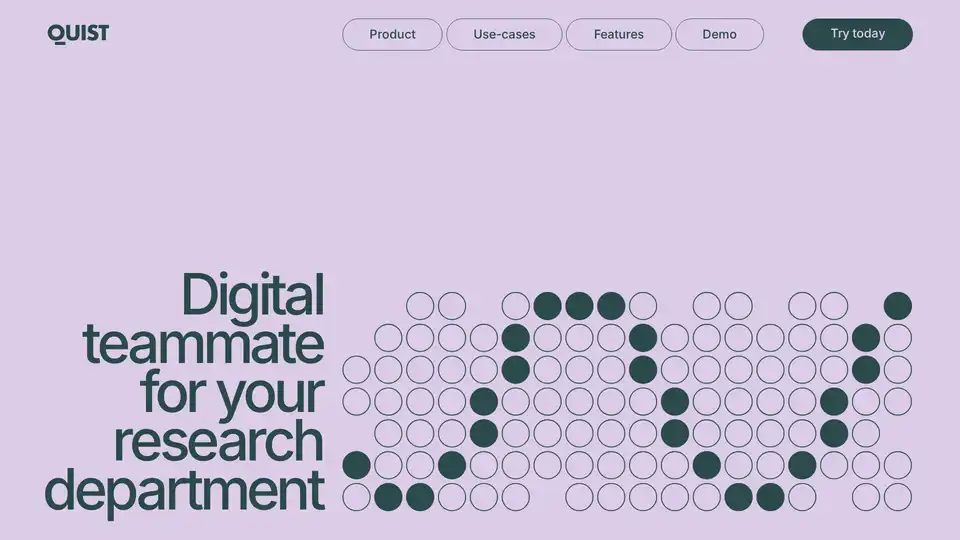
Quist AI is an AI-powered research assistant that automates data analysis and report generation, helping researchers and analysts save time while delivering accurate, data-driven insights for business intelligence.
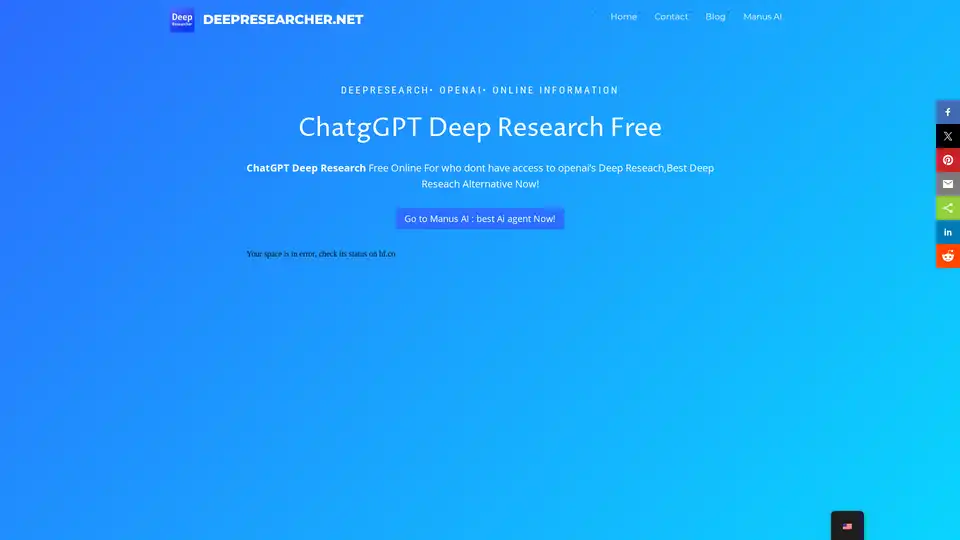
Discover ChatGPT Deep Research Free, the top online alternative to OpenAI's Deep Research for those without access. Perform in-depth AI-powered web research, generate detailed reports with citations, and explore complex queries efficiently—all for free.
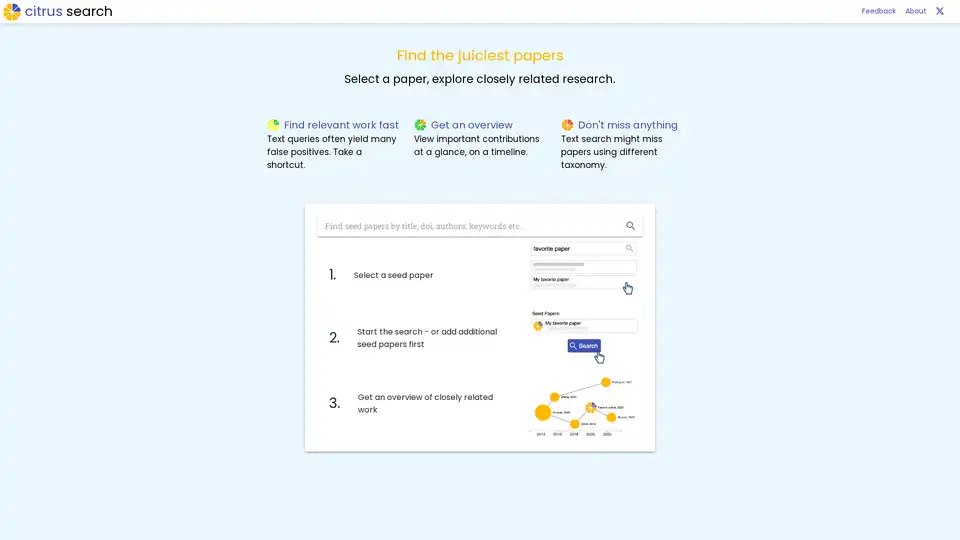
Discover relevant scientific papers quickly with Citrus Search, an AI-driven tool that uses similarity measures like citation networks and content analysis to provide overviews of related research from over 200 million publications.
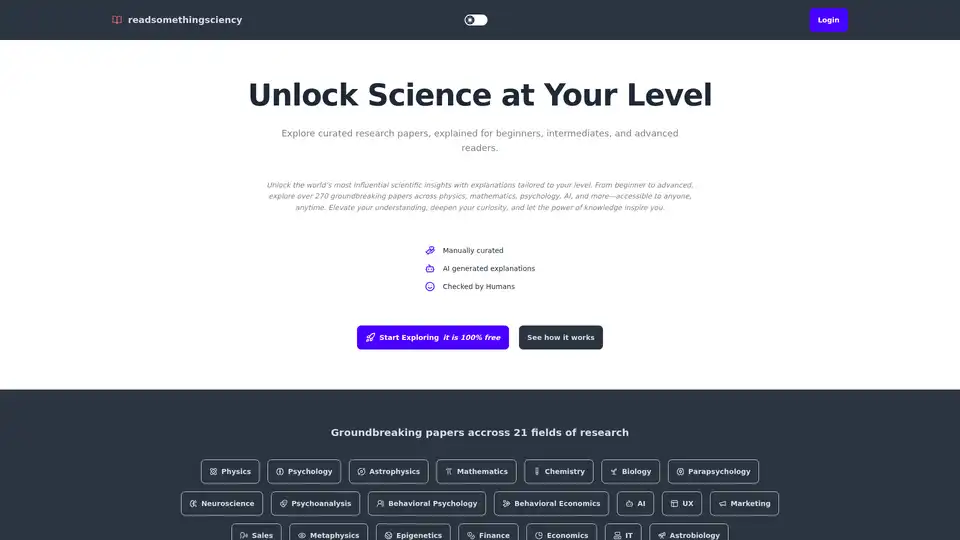
Explore over 270 curated scientific papers in physics, AI, psychology, and more, with AI-generated explanations tailored to beginner, intermediate, and advanced levels—all 100% free on ReadSomethingSciency.
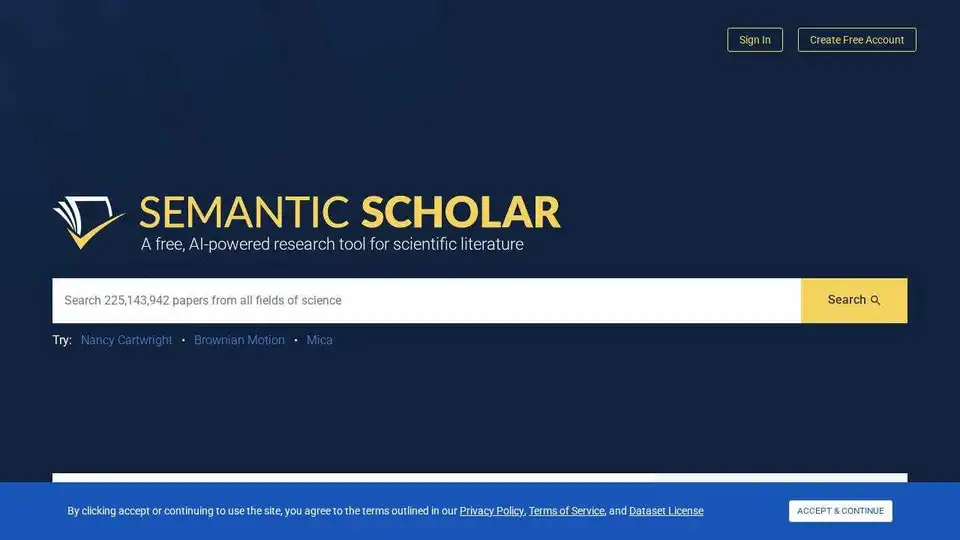
Semantic Scholar is a free, AI-powered research tool that helps scholars discover relevant scientific literature by understanding the semantics of research papers.

TXYZ is an AI-powered tool revolutionizing knowledge discovery and research workflows. Access millions of academic papers, gain AI-driven insights, and streamline your research process.
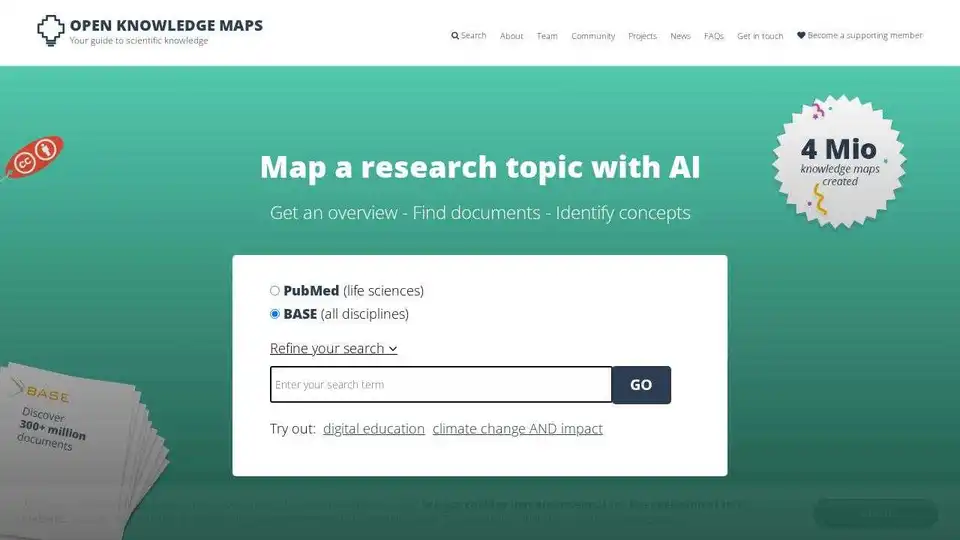
Open Knowledge Maps: An AI-based search engine providing visual overviews of research topics, helping you find relevant papers and identify key concepts in scientific knowledge.
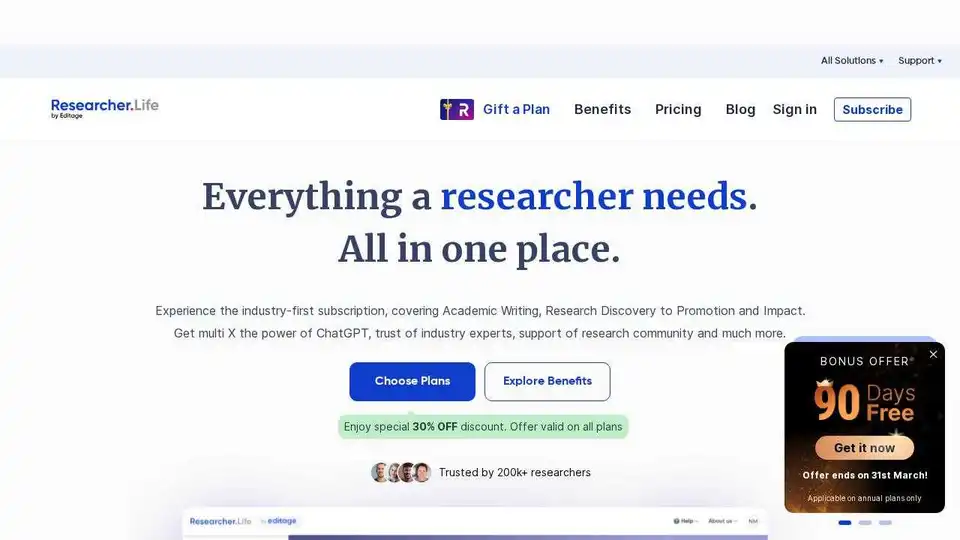
Researcher.Life offers AI tools for research, including a journal finder, scientific illustration tool, literature recommender, and academic writing assistant. Trusted by 5M+ researchers worldwide.
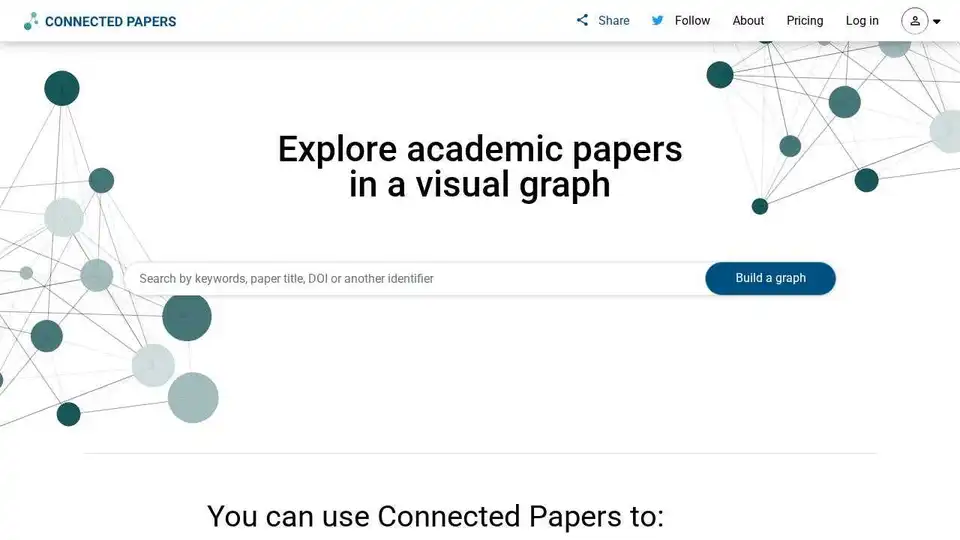
Connected Papers is a visual tool to help researchers find academic papers relevant to their field of work.
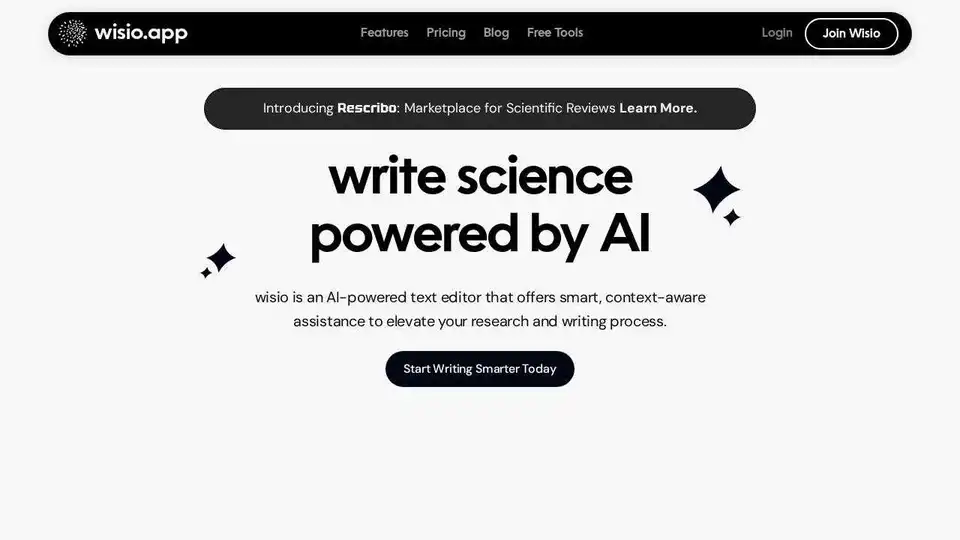
wisio is an AI-powered writing assistant designed for scientists. It offers AI suggestions, relevant paper discovery, text translation, and more to enhance scientific writing.
